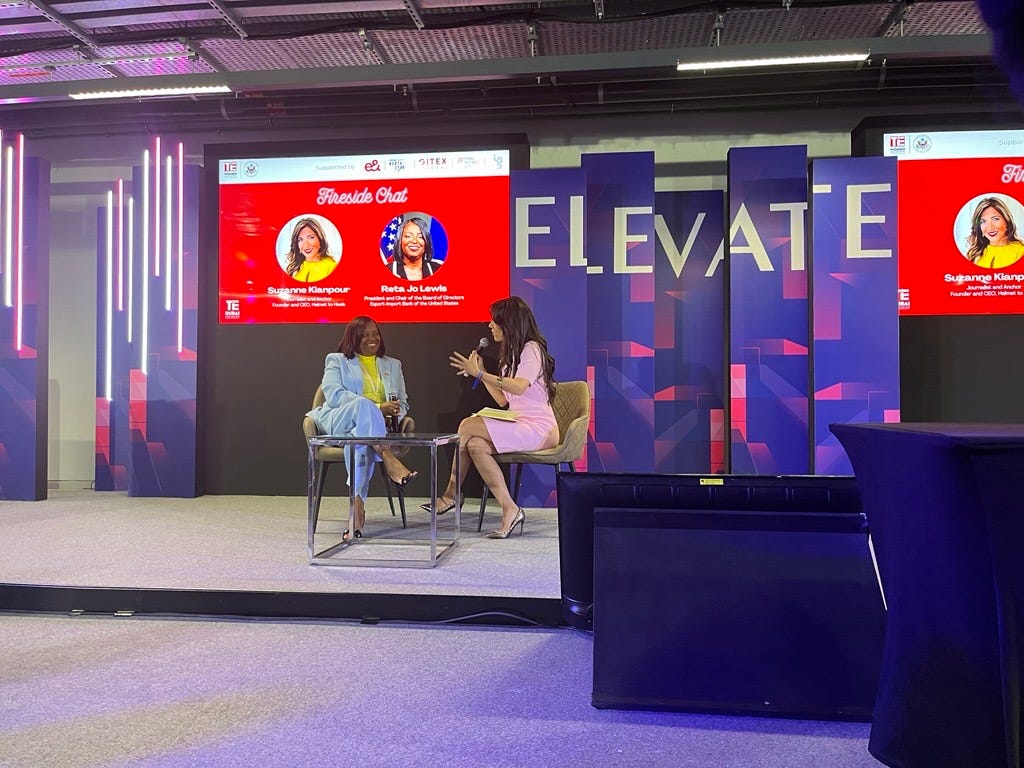Women in tech and AI: can we bridge the divide?
We're still don't talk enough about gender bias in tech. So here are our questions this week... And our first Substack collab!
💬 At “Content Is Not King” we believe conversations are king. And these are our CONVERSATIONS STARTERS this week:
🦾 What is the ‘Women Building’ initiative? — by guest author Suzanne Kianpour
➕ How to increase women’s representation and leadership in the tech industry?
🦾 What is the ‘Women Building’ initiative?
* by of — our first guest author
At this year’s GITEX Global, I had the distinct pleasure of moderating panels that didn’t just touch on innovation — they redefined it. Through the ‘Women Building’ initiative presented by Helmet to Heels, we celebrated dynamic women who are not merely making their mark in traditionally male-dominated industries, but are actively reshaping them. These leaders are transforming spaces that have long sidelined women, turning challenges into opportunities and creating new pathways for those who follow.
One panel, in particular, stole the show. Danielle Brewin Graham, an inspiring investor with The Firehood Angels, is not just a champion for women-led startups — she’s creating the future of tech by funding them.
Joining Danielle was Morin Oluwole, a powerful force on the Board of Directors at Breitling, France. Morin is the epitome of elegance and innovation, blending the worlds of luxury, fashion, and technology into a seamless vision for the future. Her contributions are a reminder that sustainability is the new frontier of luxury, and women are leading the charge.
Then there was Sissi Johnson, President of the Berlin Fashion Film Festival, whose creativity and vision at the intersection of fashion and technology pushed the conversation to new heights. Alongside them was Caroline Yap, the sophisticated and trailblazing Managing Director of Global AI Business and Applied Engineering at Google Cloud. With a focus on responsible AI, Caroline’s leadership is shaping how industries approach artificial intelligence — making it more ethical, sustainable, and impactful than ever before.
A special mention goes to VeriStyle, one of the most exciting companies discussed during the panels. As a standout from the TiE Global Pitch competition, VeriStyle is revolutionizing the retail industry with technology-driven sustainability solutions. The company’s innovative approach is precisely why institutions like the U.S. Export-Import Bank, led by Reta Jo Lewis, are committing to supporting female-led enterprises on a global scale. As Reta said, “We are empowering women-owned businesses by giving them the resources to succeed on a global level.”
This year’s panels proved one thing beyond a shadow of a doubt: women are not just shaping industries — they are redefining the future of tech, fashion, and diplomacy. We are no longer playing by the old rules; we are rewriting them.

* Suzanne Kianpour is the Anchor of “News with Suz” and the Founder and CEO of Helmet To Heels. She is an Emmy-nominated journalist with over a decade of experience in TV, radio and digital journalism, working on the front lines of some of the world’s biggest breaking news stories, providing insight and analysis on leading political and foreign policy issues, informed by both a vast network of international contacts and extensive on-the-ground experience at home and abroad.
🧠 What’s the gender gap in tech and AI?
“We are at a pivotal moment for women in the workplace,” said Sarah Steinberg, Head of Global Public Policy Partnerships at LinkedIn, this past September during an event on the sidelines of the United Nations General Assembly high-level meetings in New York. “For many years we were seeing the same old story, steady but insufficient progress on gender equality in the workplace. We don’t see that anymore.”
Steinberg pointed out that women are not only under-represented, but their numbers are actually declining in terms of hiring rates: “W'e’ve seen a decline of hiring women into leadership globally so that we’re now back to 2019 levels. When it comes to the industries in the fields that are really driving the future — STEM, the green economy, AI — we see women significantly under-represented and not making sufficient progress in closing that gap. […] When we talk about the impact of generative AI, that’s the context in which those technologies are being produced.”
Steinberg also highlighted that the impact goes beyond new jobs: “One third of women globally work in occupations we think are likely to be disrupted by generative AI compared to just a quarter of men. Ultimately, this technology is going to create more jobs but we have to be aware of the fact that it’s going to reshape the jobs and skills that we already have.”
The session, entitled Paving new Pathways for Women in Tech, was moderated by Mita Hosali, the Deputy Director of the UN’s News and Media Division, and included Steinberg, in addition to Tami Bhaumik, Vice President of Civility and Partnerships for Roblox, and Hélène Molinier, Senior Advisor on Digital Cooperation at UN Women.
Where do women stand now?
Women comprise just 22% of AI professionals globally, reflecting a clear gender gap, according to Jessica Haas, Women in Technology International
For women, there’s an “even lower representation at senior levels — occupying less than 14% of senior executive roles in AI,” data analyzed by Siddhi Pal, Ruggero Marino Lazzaroni, and Paula Mendoza in a recent report titled AI's Missing Link: The Gender Gap in the Talent Pool show.
Northeastern in Silicon Valley Regional Dean Caroline Simard commented Anita Borg’s famous 1995 call for gender parity in computer science, “50/50 by 2020” and said: Well, “The sector fell short of that mark—although by exactly how much depends on the metric. Women represented 31.5% of total employees in large tech companies in that year, and only 23.1% of technical roles.”
“In 2024 women continue to have lower representation in the STEM workforce than in the non-STEM workforce, with representative shares of 28.2% and 47.3%, respectively,” according to the World Economic Forum’s 2024 Global Gender Gap report.
Among the key findings from the Web Summit’s Global Women in Tech Report 2024 reported here on Substack by
, “A substantial 50.8% of women reported experiencing sexism in the workplace, a figure that has shown little change in recent years.” added: “Nearly half (49.1%) of women in the tech sector feel pressured to choose between family and career, marking a 7% increase from last year.”“Today, just one in four tech executive roles are held by women, according to the Women Business Collaborative, an advocacy group” — as reported by
in a recent post, Tech Has Never Looked More Macho, in her .
🌐 Is AI creating regressive gender stereotypes?
A recent UNESCO study revealed worrying tendencies in Large Language models (LLM) to produce gender bias, as well as homophobia and racial stereotyping. Women, according to UNESCO, were described as working in domestic roles far more often than men — four times as often by one model — and were frequently associated with words like “home,” “family” and “children,” while males were linked to “business,” “executive,” “salary,” and “career.”
“These new AI applications have the power to subtly shape the perceptions of millions of people, so even small gender biases in their content can significantly amplify inequalities in the real world. Our Organization calls on governments to develop and enforce clear regulatory frameworks, and on private companies to carry out continuous monitoring and evaluation for systemic biases, as set out in the UNESCO Recommendation on the Ethics of Intelligence artificial, adopted unanimously by our Member States in November 2021.”
— Audrey Azoulay, UNESCO Director-General
In November 2021, UNESCO members unanimously adopted the Recommendation on the Ethics of AI, calling for specific actions to ensure gender equality in the design of AI tools, including ring-fencing funds to finance gender-parity schemes in companies, financially incentivizing women’s entrepreneurship, and investing in targeted programs to increase the opportunities of girls’ and women’s participation in STEM and ICT disciplines. In February 2024, eight global tech companies — GSMA, INNIT, Lenovo Group, LG AI Research, Mastercard, Microsoft, Salesforce and Telefonica — endorsed the Recommendation.
Want to learn more about gender bias?
“Using dozens of prompts on three of the leading image tools — Midjourney, DALL-E and Stable Diffusion — The Post found that they steer users toward a startlingly narrow vision of attractiveness. Prompted to show a ‘beautiful woman’, all three tools generated thin women, without exception. Just 2 percent of the images showed visible signs of aging,”
and wrote.More than a third of the images had medium skin tones. But only nine percent had dark skin tones.
Asked to show “normal women,” the tools produced images that remained overwhelmingly thin. Midjourney’s depiction of “normal” was especially homogenous: All of the images were thin, and 98 percent had light skin.
“Normal” women did show some signs of aging, however: Nearly 40 percent had wrinkles or gray hair.
➕ How to increase women’s representation and leadership in the tech industry?
Enter the Cadence Giving Foundation's Fem.AI Alliance, announced just this month and dedicated to evolving the future workforce by increasing women’s representation and leadership in the tech industry. Founding members include tech companies like Cadence Design Systems, Equinix Foundation, NetApp, NVIDIA, and Workday.
“Ensuring that women play a role in this technology revolution is not just a nice-to-have; it is essential,” said Tina Jones, senior vice president, Global Human Resources at Cadence. “We must have enough talent to capitalize on what AI promises to deliver, and we need a true cross-section of society working on AI so that we create technology that serves everyone.”
The Cadence Giving Foundation is committing $20 million and working with nonprofit partners and universities to address the three critical leakage points where women decide not to pursue STEM careers.










We love this first collab!!! Thank you Suzanne!